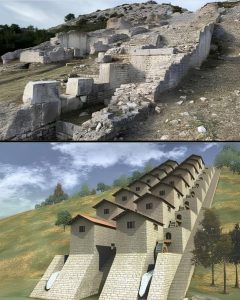Discovered in southern France, this Roman flour mill, dating to the early 2nd century AD
Discovered in southern France, this Roman flour mill, dating to the early 2nd century AD, was an industrial marvel! Its 16 water wheels could produce an astounding 4.5 tons of flour daily. This was enough to feed up to 40,000 people, showcasing the incredible scale of ancient Roman engineering.

This Roman flour mill stands as a testament to the ingenuity of its builders. Located in southern France, the early 2nd century AD site harnessed water power with 16 wheels. Such an industrial output — 4.5 tons of flour per day — highlights the advanced capabilities of Roman technology and their ability to sustain large populations.

The sheer capacity of this ancient Roman mill is truly impressive. Producing enough flour for 40,000 people daily, it underscores the sophistication of Roman infrastructure. This discovery in southern France offers a powerful glimpse into the industrial might that supported their vast empire during the 2nd century AD.

More than just a mill, this site represents a pinnacle of ancient Roman engineering. Its discovery in southern France reveals how innovative the Romans were in utilizing natural resources. The 16 water wheels are a clear indicator of their advanced industrial scale, a truly remarkable achievement for the early 2nd century AD.
